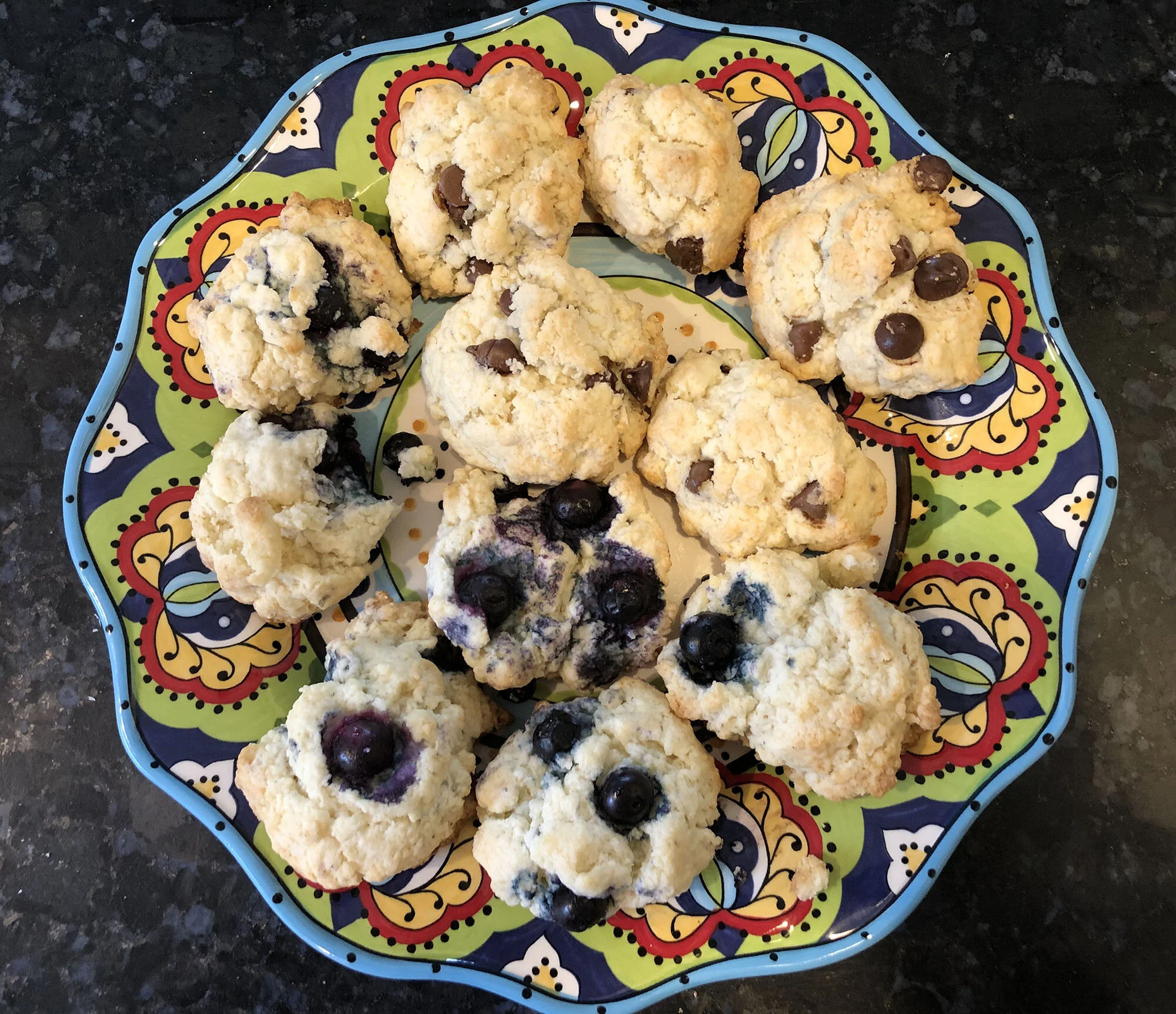Food Is Love, Especially During a Pandemic
I scanned the pantry: whole wheat flour, gluten free flour, and cake flour.
Cake flour, I decided.
I opened the fridge, knowing there was no way I’d find buttermilk. I was surprised to find heavy whipping cream. Who had bought that?
I texted my mom and asked if I could use cream in her scones recipe. She reassured me that all would be well.
Usually I’m not patient enough to follow a recipe, but I tried to follow this one. With more time at home than ever before, I hardly had an excuse not to. When the scones came out of the oven, I was glad I had. Something about the combination of delicate cake flour and heavy whipping cream gave them an unexpectedly wonderful melt-in-your-mouth quality. One of my teenagers declared them “the best thing that you’ve ever made.” Though it’s true she wanted nothing to do with the blueberry version (“Fruit? In breakfast?”), opting instead for the ones with chocolate chips.
I like scones – a lot – and sometimes I even enjoy baking. But I spend more time thinking about food than cooking it. As a psychology professor, researcher, and writer, I have studied eating behaviors and body image for over 20 years.
In a recent survey of more than 900 young adults, conducted by some of my colleagues at the University of Missouri’s Center for Body Image Research and Policy, 40% said they would rather contract COVID-19 than gain 25 pounds while social distancing. This finding saddens me for many reasons, most of all because of the light it sheds on how deeply entrenched many people’s concerns about eating are.
But it’s also possible to use the opportunity of being stuck at home — many of us with our families — to develop a more positive relationship with food.
Like many others, my family has been doing a lot of baking while under the stay-at-home order. The scones were a hit, but there have been misses too. It turns out that sourdough bread has way too many steps and takes way too many days for me. I guess it was inevitable that my one attempt fell (literally) flat.
Even with the missteps, food has become a highlight of our days. We make “real” breakfasts and lunches instead of just grabbing something on the go. We start asking, “What’s for dinner?” early in the morning. Without homework and work commutes, often at least two of us come together to make dinner at the end of the day.
Research suggests that family time in the kitchen may have health benefits for kids. Recruiting them to help cook makes them more likely to eat vegetables and other healthy food. This finding is consistent with what researchers have called the “IKEA effect”: people prefer things they help create to things created by others — though I suspect the people who coined this term have never put together a complicated piece of IKEA furniture. Some parents put their kids in charge of meal prep at least once a week. Given the potential benefits, keeping kids in the kitchen post-pandemic may be an unexpected positive outcome of our time sheltering in place.
Sharing food is a form of caring. Cooking is something we do for others and also for ourselves. Healthy foods nourish us. Celebratory foods enhance rituals and social gatherings. Foods we love can fortify us psychologically and spiritually during this time of stress and uncertainty.
My mother recently reminded me that her grandmother used to bake scones and other pastries. My great-grandmother was a German immigrant with limited English skills who spent part of her adulthood cleaning other people’s houses. Baking was a way to do something special for her family.
Now it’s my turn.
Pribuss Family Scone Recipe
2 cups flour (cake or all purpose)
¼ cup sugar
1¼ teaspoon baking powder
¼ teaspoon baking soda
¼ teaspoon salt
½ cup cold butter, cut into pieces
¾ cup buttermilk (or heavy whipping cream)
1 teaspoon vanilla
½ to 1 cup frozen blueberries, or other fruit, or chocolate chips, or whatever you like (optional).
Preheat oven to 400 degrees.
Oil cookie sheets, or use a scone pan if you have one.
In a bowl, mix dry ingredients: flour, sugar, baking soda, baking powder, and salt.
Blend butter into the dry ingredients with two knives or a pastry blender. Add milk and vanilla.
Stir just until the dough comes together. Don’t overmix.
Add the “extras” (fruit, chocolate chips, etc.).
Bake for about 17 minutes. Enjoy while warm. Store in an air-tight container – if you have any left to store!
You can reheat scones on a cookie sheet in a 300 degree oven for about 4 minutes.
Charlotte H. Markey, Ph.D., is a professor of psychology and health sciences at Rutgers University – Camden, and author of the forthcoming books “The Body Image Book for Girls: Love Yourself and Grow Up Fearless,” and “Be Your Best Self: The Body Image Book for Boys.” She lives in Swarthmore.



